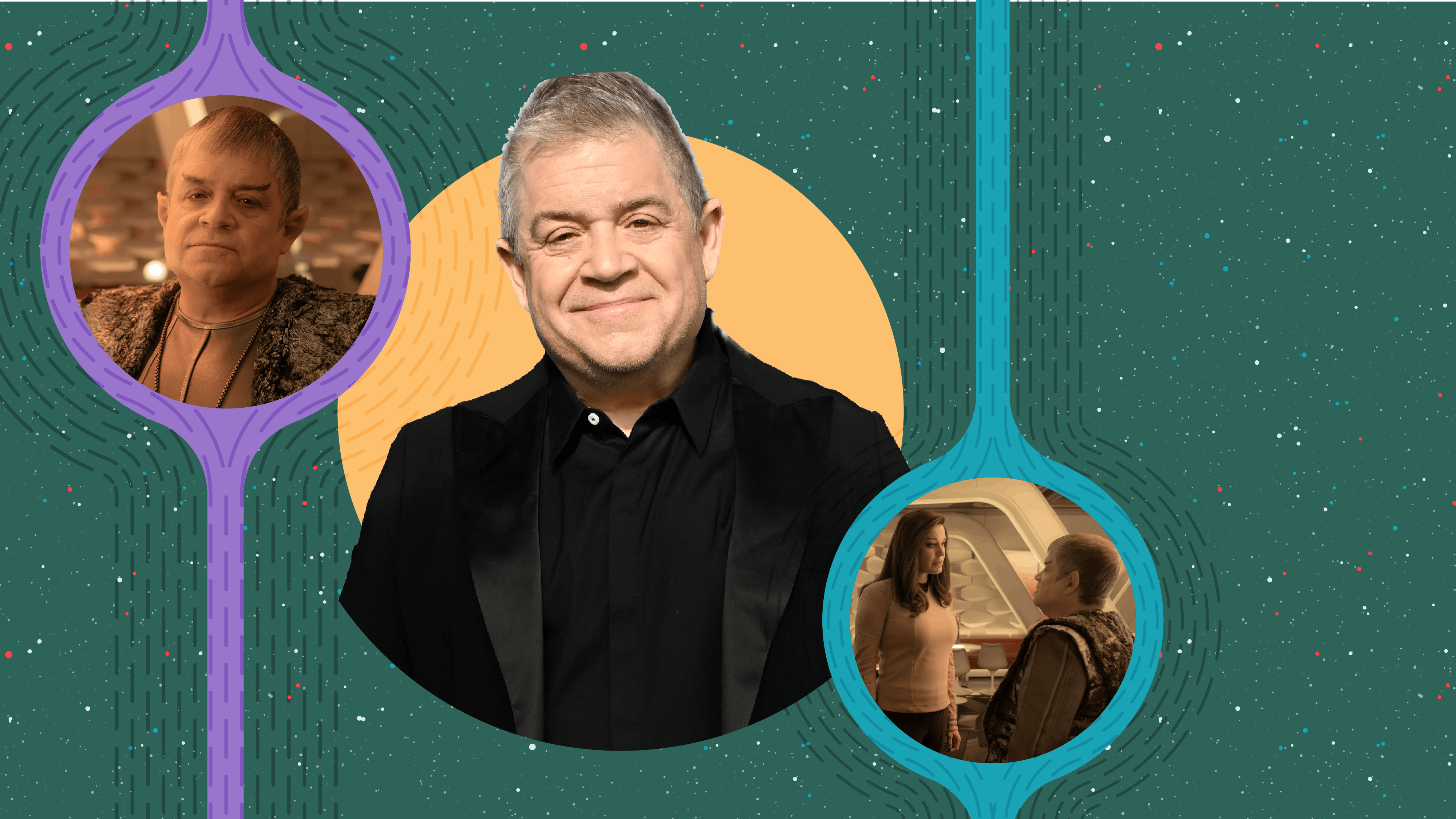Published Aug 4, 2023
WARP FIVE: Director Jeff W. Byrd Takes Us Under the Cloak of the Klingon War
The director gives us insight on the heavy toll of war and the episode’s open-ended conclusion.
SPOILER WARNING: Discussion for Star Trek: Strange New Worlds Season 2, Episode 8 "Under the Cloak of War" to follow!
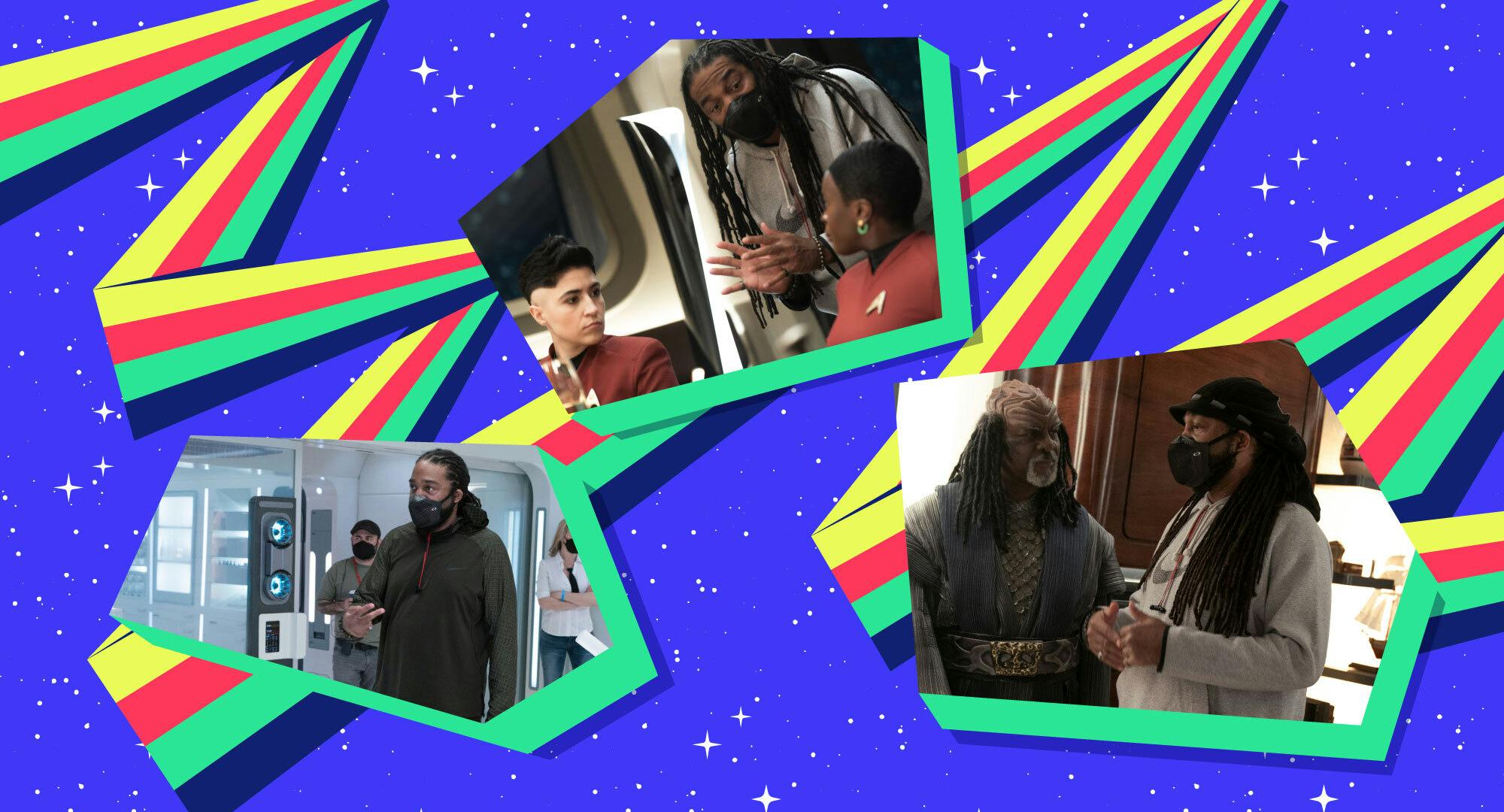
StarTrek.com
Welcome to Warp Five, StarTrek.com's five question post-mortem with your favorite featured talent from the latest Star Trek episodes.
Anchored between the crossover episode and musical episode, ’ “” provided viewers with a deeper understanding of the seeds laid out in the season’s opener, “.”
The story balances the present realities Captain Pike’s request of his crew to welcome a Klingon defector and Federation ambassador — Dak’Rah — with the past horrors those Klingon War veterans experienced at a field hospital stationed near the front lines of battle on the moon of J’Gal.
Star Trek: Strange New Worlds | Battlegrounds: Starfleet's Veterans
Ahead of the episode’s release, StarTrek.com had the opportunity to talk to director Jeff W. Byrd about his love of Star Trek, preparing the cast for the heavy themes of the episode, Dr. M’Benga’s shocking reveal at the end, whether he’s Team T’Pring or Team Chapel, and more!
On Making First Contact
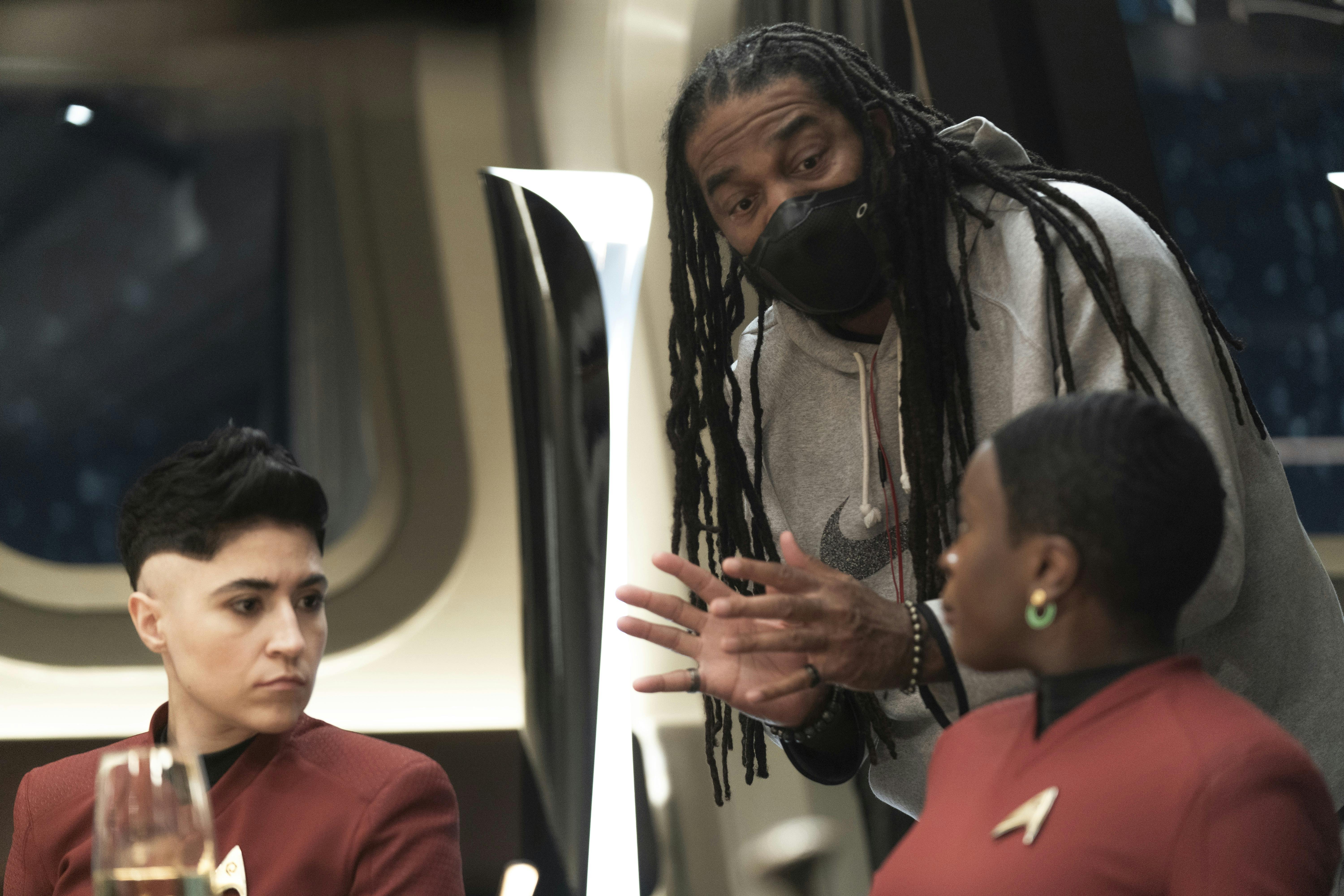
Behind-the-Scenes of "Under the Cloak of War"
StarTrek.com
Jeff Byrd’s love for Star Trek began at an early age with his family surrounding their television set together. “Back in the day, when I was just a little boy, my parents used to have us watch because of Uhura,” recalls the director. “She was the only Black woman on television at the time. We would all gather around the TV to watch it and hope it was an Uhura episode.”
“And if it wasn’t, then we'd still watch it,” Byrd continues. “She had her finger to her ear so we were all getting excited about that stuff. And then we got addicted to it, and fell in love with Kirk and Spock, and Sulu, and all the OGs. I grew up from there, to now come full circle, and have directed and Strange New Worlds. It's incredible. My dad is very influential in the formation of this career that I’m in and embracing.”
On How Discovery Shifted Gears for Him
Upon being prompted on what he’d select as his favorite and/or definitive series, Byrd reflects before revealing, “That’s a good question. Now you’ve got me thinking. As much as I love - I don’t know. I really love Discovery for Michael Burnham. I love what they were able to do there, and how they were able to flip the concept of what we thought Star Trek was.”
There are two eras for Byrd — The Original Series and Discovery. An unapologetic fan for decades, Byrd shares that Star Trek: Discovery reignited his love for the franchise and sees Michael Burnham as the unifying, “eye-opening” thread of both eras by connecting her to Spock. “Before Discovery, yes, it was TOS all the way,” notes Byrd. “But then, when Discovery [arrived], I was, ‘I can’t stop watching this; wow!’ All the things I thought, they were shifting a little bit.”
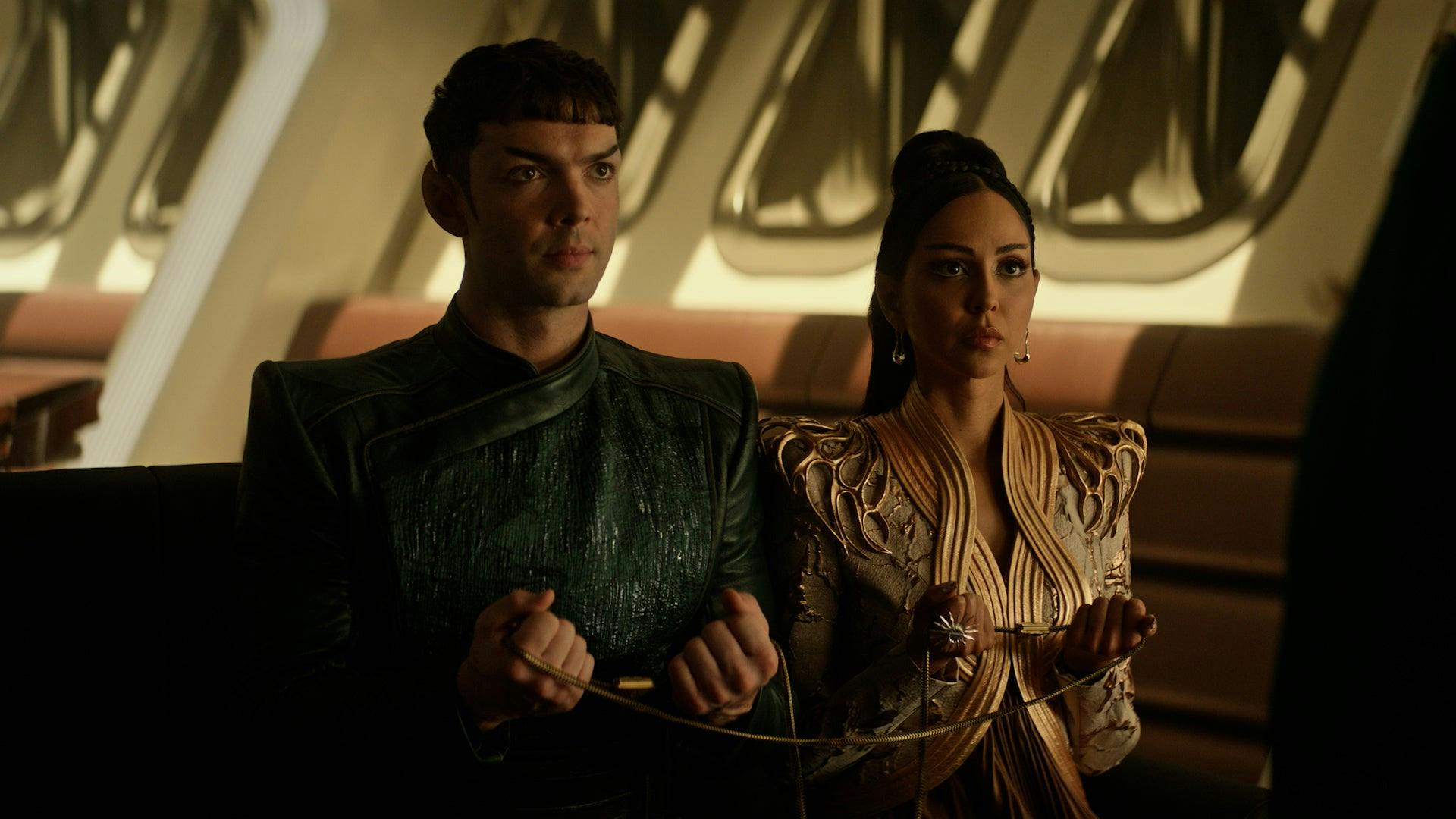
"Charades"
StarTrek.com
The “Under the Cloak of War” director praises Star Trek: Strange New Worlds for once again, showing a different perspective to events laid out in The Original Series. “Now with Strange New Worlds, it’s the same thing with Spock and T’Pring,” Byrd highlights. “I remember on set talking to Ethan Peck and Jess [Bush] and we were talking about [Spock and Chapel’s] relationship and everything. And I told them, ‘I got to really say to you guys, I’m Team Spock-T’Pring.’ Especially now that I know the backstory and watch her support him. I love her; she’s amazing! And then I was, ‘Chapel, you’re a homewrecker. Leave him alone. He’s got a good woman.’”
“I love these shows because they put these new spins on things that I’ve already kind of adopted,” Byrd adds, “and now I have to rethink that whole ‘’ episode from TOS. You know what? I’m not mad at her for doing what she did,” before concluding, “I guess I don’t have just one [favorite]; I love them all!”
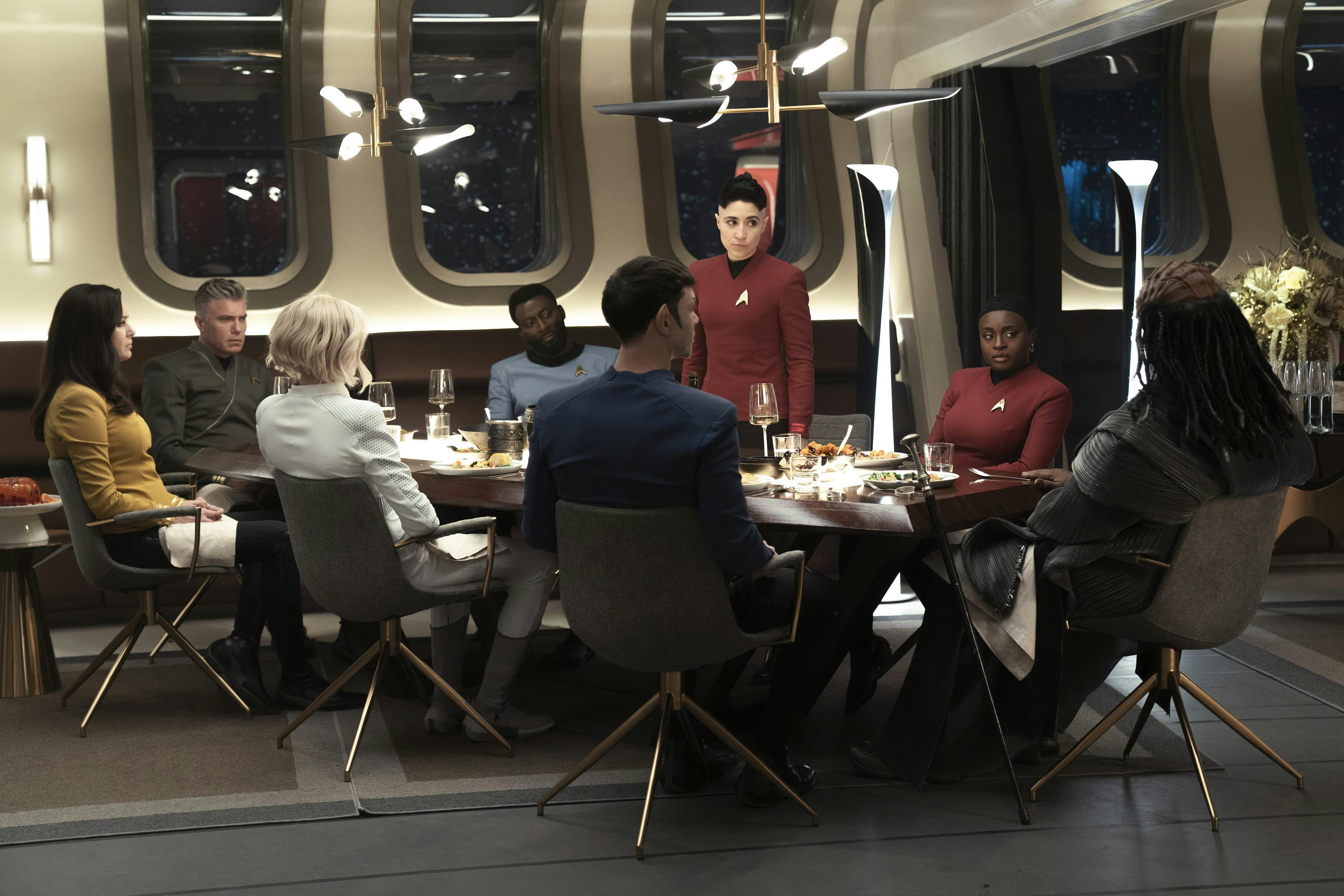
"Under the Cloak of War"
StarTrek.com
An exciting opportunity with Strange New Worlds was the ability to connect with events in earlier works. Byrd shares that he revisited and giving it “another look before starting work on this episode.”
“I love the fact that we went back to the old-school versions of Klingons,” he admits. “This Klingon scenario touches upon their OG modus operandi. We definitely did a little Undiscovered Country viewing and talked about it with the actors on set to make sure we were all in sync, and we all were.”
On Connecting with Talent and the Series’ Collaborative Process
, the director of “Ad Astra per Aspera,” Byrd values the one-on-one pre-production prep he had with each of the talent in the episode, including Robert Wisdom who plays the former general, current ambassador Dak’Rah, and how it helped the cast channel the intensity of the episode.
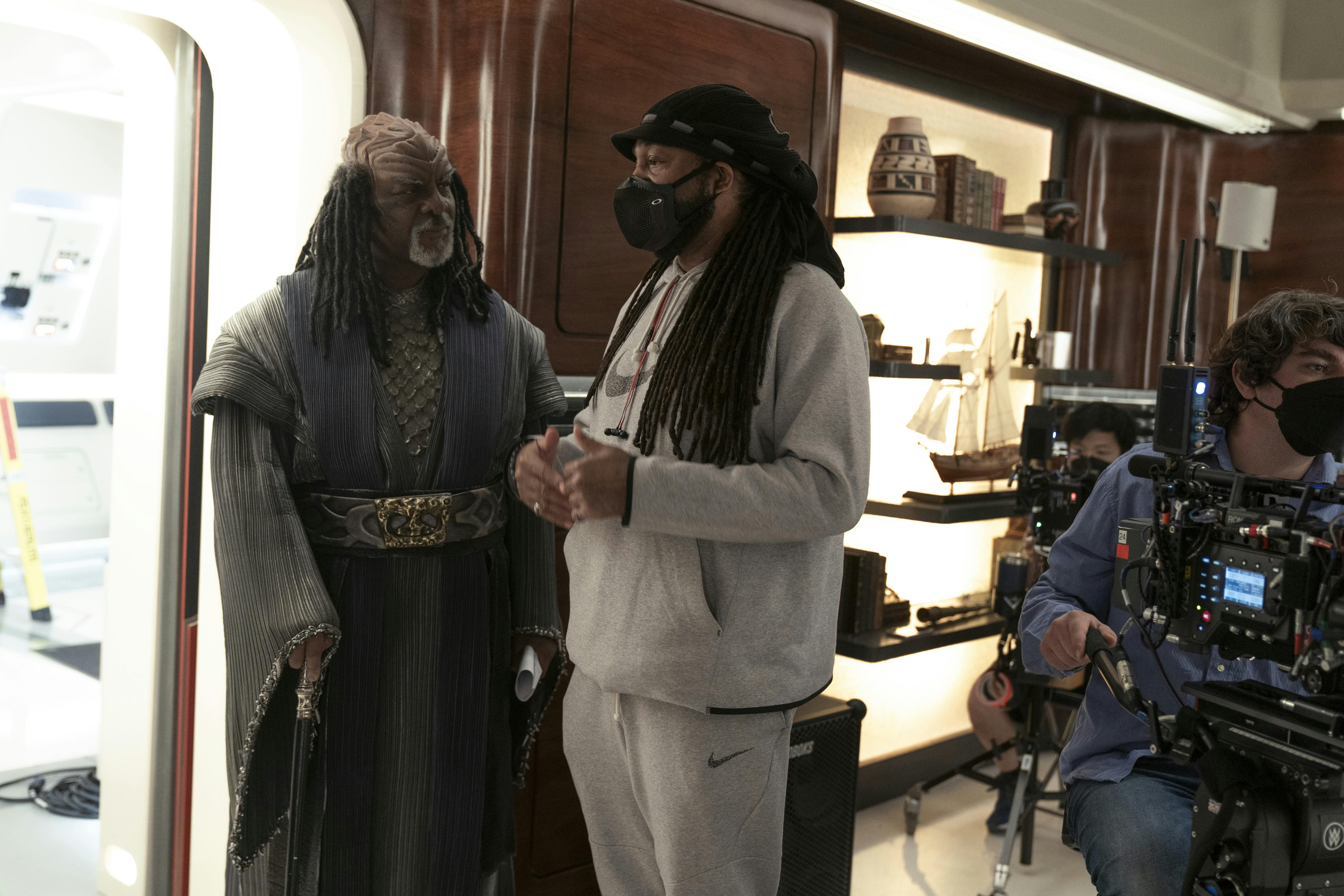
Behind-the-Scenes of "Under the Cloak of War"
StarTrek.com
Commenting on the story’s intensity, Byrd notes, “That was on purpose. When I went in, I really wanted it to feel like a closeup show, almost claustrophobic in a way. Because that's kind of how war can be.”
Providing insight to his views of the Klingon defector, Byrd states, “My meeting with Mr. Wisdom went great. We talked about who Rah was, versus who he is now in the episode. And We worked out what he thinks Rah is and what I think or thought Rah is or was.”
“[Wisdom] actually felt Rah was changed,” Byrd expanding on their differing viewpoints. “I didn't feel Rah was so changed; I felt Rah was a little bit of a sellout. Well, he wasn't going along the Klingon path. But I understood why. Then Davy Perez, our amazing writer of this episode, he and I would have constant conversation every day. Everyday conversations, and sometimes ride back to the hotel together, and have little battles with, ‘Well I think this. Yeah, well, I think... What do you think? Well, you wrote it, because this would have made me feel this thing.’ We'd try some stuff on set, different versions of it. And that would work out.”
On Pulling Back the Curtain on M’Benga and Chapel’s Past
Byrd cannot be more thankful to have an episode led by Babs Olusanmokun, who plays Dr. Joseph M’Benga, and Jess Bush, who plays Nurse Christine Chapel.
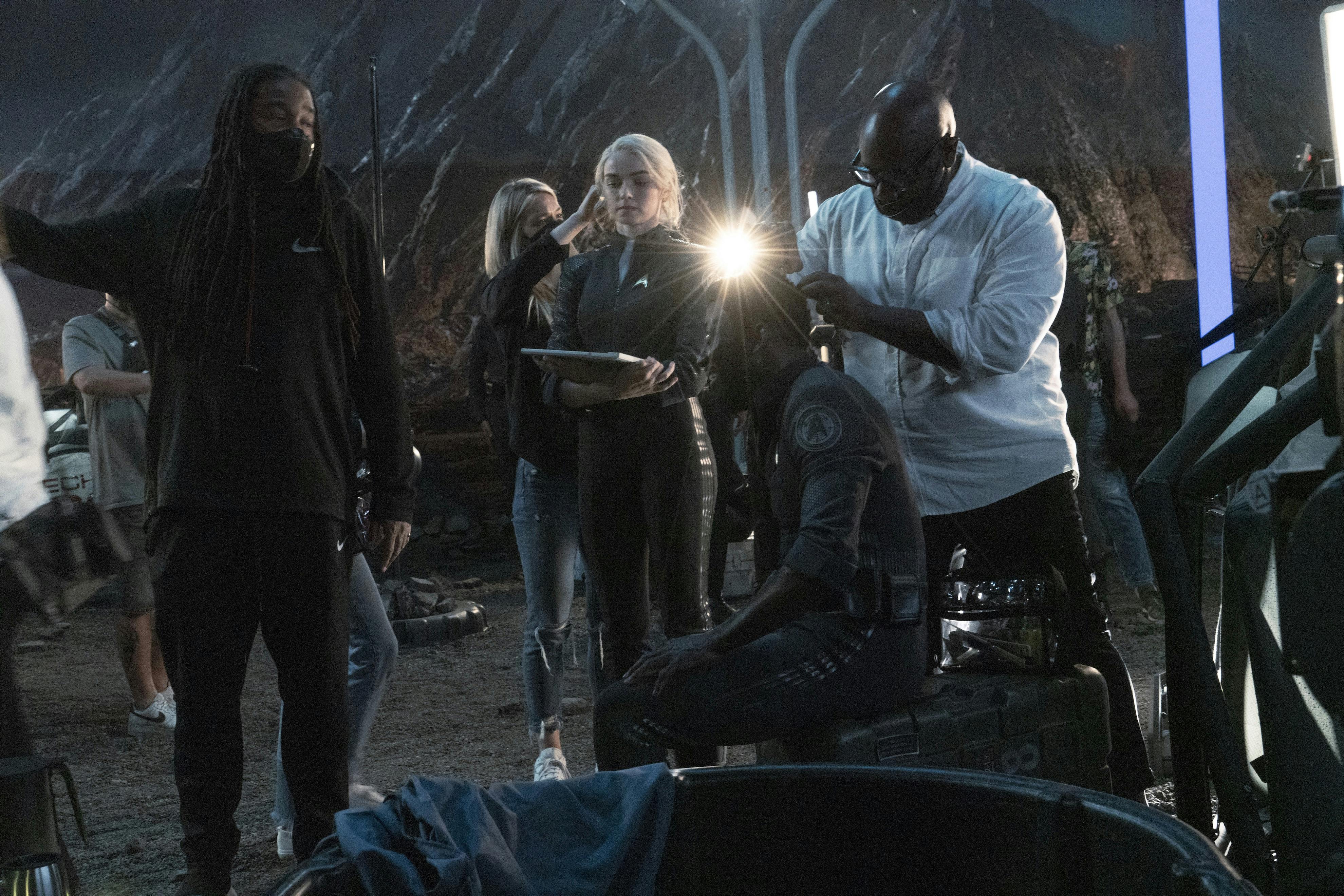
Behind-the-Scenes of "Under the Cloak of War"
StarTrek.com
The director shares, “Babs and Jess Bush were amazing in this episode because they did a lot of research, and a lot of just pulling video, archival footage of wars and PTSD moments, and the aftermath of what people went through after they came back home. From whether it be Iraq, or whether it be Afghanistan, or wherever. They pulled a lot of footage that I watched over on different weekends, and during the days, during the nights, I would go back home after we shot, or after we were prepping, and watched this footage that Jess sent me, or this footage that Babs sent me. And it was pretty amazing that they would put that much into it.”
“For them, it was just a different episode than the rest of them were,” explains Byrd. “We were able to really pour into each other and pull out different things. Obviously, it's a standalone thing. Because after this, we have the musical episode right, and before, it was the crossover with the animated series. Now all of a sudden, we got a heart massage, and battle, and people getting killed left and right.”
Praising the series’ return to episodic format, Byrd highlights, “We were able to then go, ‘Okay, forget about those two things. We're doing our own thing.’ And the actors were very excited about that. And I was able to give them some leeway, and give them some direction, but also give them room to bring their research to the table as well.”
On Leaving the Shocking Ending Open for Interpretation
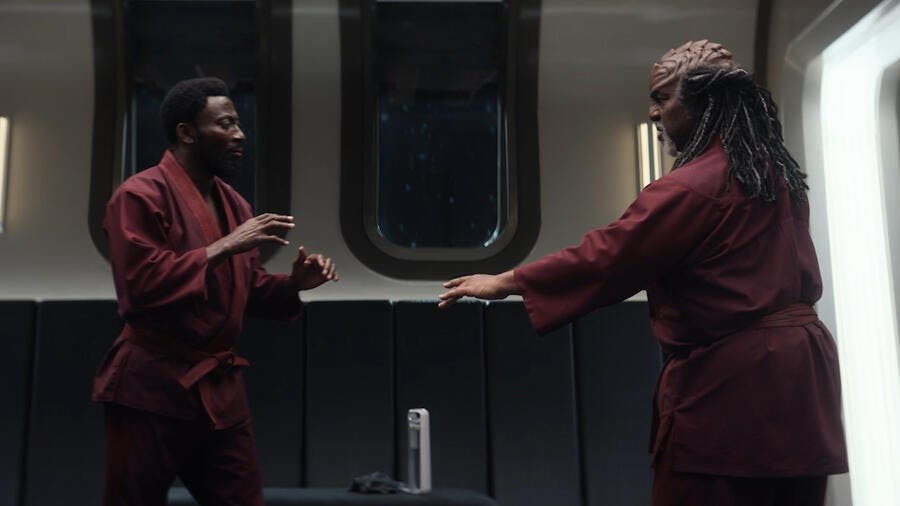
"Under the Cloak of War"
StarTrek.com
The mounting tension between Dak’Rah’s presence and unrelenting pursuit of collaboration with M’Benga’s desire to be left alone culminates in the third act when the ship’s chief medical officer reveals he knows the Klingon ambassador was not the the real “Butcher of J’Gal.” It’s M’Benga who must carry that shame of brutality, while Rah must carry the shame of cowardice. He used M’Benga’s bloodshed to rebrand himself as a saint. However, “Under the Cloak of War” chooses to obscure the resulting physical confrontation. All we know for certain is that the scene concludes with Rah on the floor in Sickbay, dead with a blade plunged in his chest.
“That definitely was on purpose,” confirms Byrd. “We shot three versions of that. Three or four versions of that ending. And I really love the ending that was chosen by the executive producers/showrunners. I love that ending because it leaves it open. It also forces us to trust them. It forces us to be like, ‘Okay, do we trust what Chapel’s saying? Do we trust what M'Benga is saying? Are they still out? Do we still love them as much now as we did before this episode?’ Because someone killed somebody in there. Somebody's dead for some reason. And was this self-defense? Was it on purpose? Was it malice driven? We know he is having a hard time with it. M'Benga has to do the heart pat; he's got to slow his adrenaline down.”
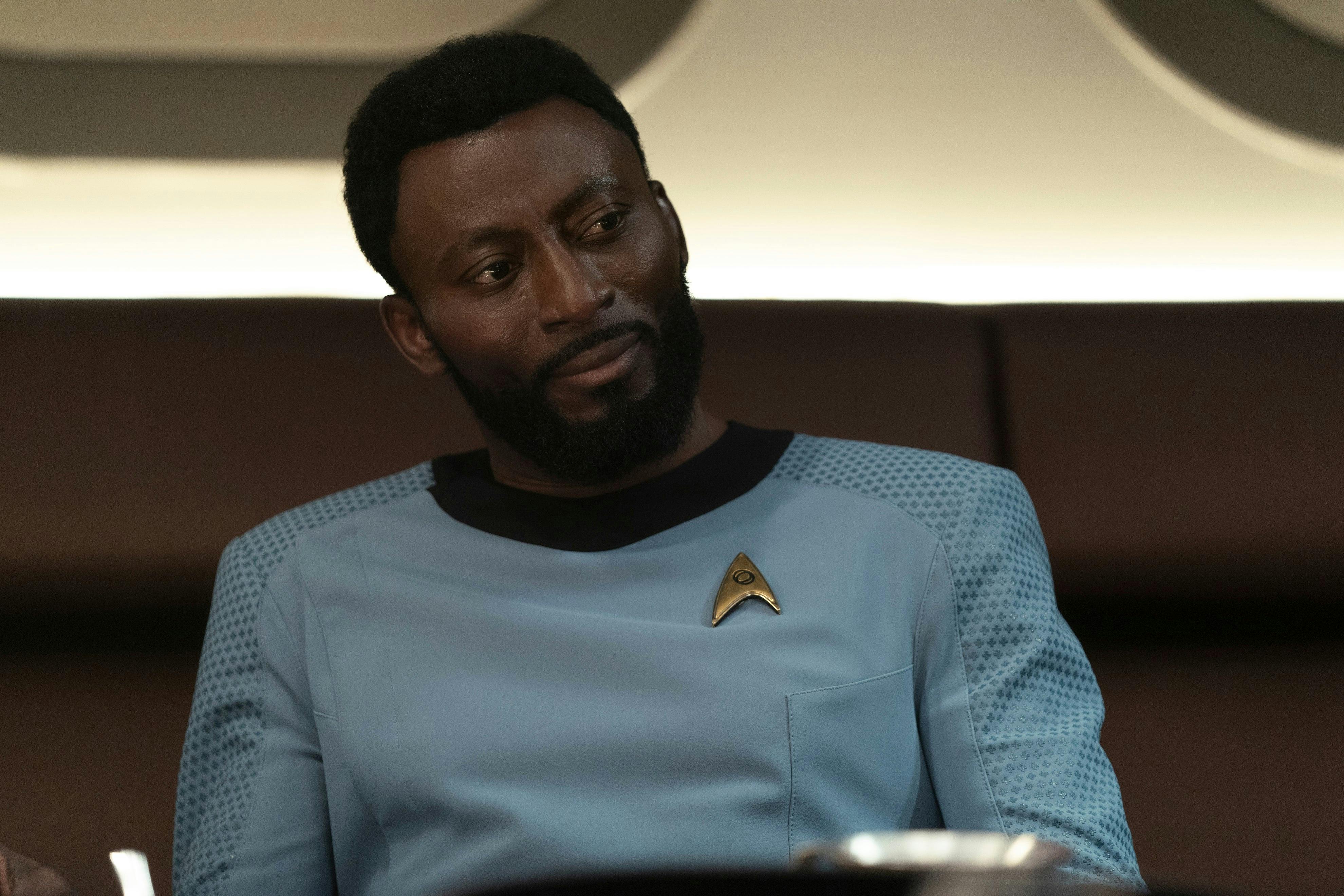
"Under the Cloak of War"
StarTrek.com
“So, what happened in there,” Byrd concludes. “I love that we're able to have you thinking, ‘Is my hero now not a hero? Is this person I love deserving of my love now?’ Because they might have just killed this person with malice. And dead men tell no tales. We don't know; Rah’s side will never be told. Rah won't be able to be like, ‘Hey, well, you know what happened….’ You don't know. And I love leaving it open like that. So, you'll never get me to nail down an answer to that question. Because I want it to always be open.”

